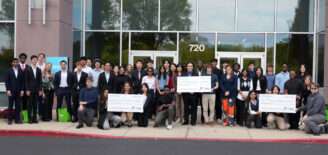Looking to 2025: Productivity Growth is a Race We Must Win
I have always been attracted to technology because it enables me to get more done with the same number of work hours. That’s essentially what productivity growth offers an economy.
When productivity increases, businesses offer more value. Wages tend to rise. Goods and services are more affordable. Consumers benefit, and economic growth takes place. Higher productivity also fuels innovation by enabling firms to invest in research and development, and advanced technology enhances competitiveness on a global scale, empowering countries to maintain strong economic positions and trade balance. In essence, sustained productivity growth is foundational for long-term prosperity, employment growth, improved public services and economic resilience.
Productivity growth has been the engine of US economic power and prosperity since World War II, adding 2.2 percent annually to economic growth and contributing mightily to a 1.7 percent annual gain in real income, per a 2023 McKinsey report. But in the past 15 years, productivity growth has averaged just 1.4 percent even as technological advances put a supercomputer in every pocket. Indiana is one of many lagging states, with only 0.66 percent compound annual growth rate from 2007 to 2019.
While company attraction and expansion remain key economic growth strategies, productivity growth is the biggest lever we can pull to grow higher paying jobs and raise standards of living for all. It’s needed to confront workforce shortages, debt, inflation and energy transition. With a return to a 2.2 percent annual productivity growth rate, McKinsey estimates a $10 trillion cumulative increase in US GDP between now and 2030 —equivalent to $15,000 per household.
How does Indiana become a productivity leader instead of a lagger? By making concerted investments in technology adoption as well as human capital development.
Technological advancement creates new industries and services while enhancing productivity in existing ones and serves as a significant driver of economic growth over time. To reap that reward, our workforce must advance as well.
The rapid market adoption of generative AI points to tremendous productive growth opportunities ahead of us. Artificial intelligence (AI) is expected to impact 85 percent of workers within the next three to five years, per the 2024 TechPoint AI & Workforce Impact Report.
Most workers could see up to 50 percent of their professional skills impacted by AI, and 30 percent of hours presently worked could be fully automated by 2030. With such technological advancement, productivity growth is no longer a vague concept that’s hard to quantify. Both the return on investment and time to value are proving out.
Organizations that have implemented AI and automation are 20 percent more likely to report high workforce productivity. Generative AI use in organizations has improved productivity by an average of 66 percent, with the largest productivity improvements in complex tasks like coding. When AI models are embedded into enterprise systems, the number of tasks that can be completed faster with the same quality increases as much as 56 percent.
It’s encouraging that Indiana companies are already embracing the need for technology adoption and workforce advancement.
Roche is ranked #1 by CB Insights in its 2024 Pharma AI Readiness Index, Eli Lilly & Co #14, and Elevance Health #7 in its Insurance AI Readiness Index. The State of Indiana, in partnership with Conexus Indiana, has invested $57 million in Manufacturing Readiness Grants across 79 counties, supporting $813 million to drive tech adoption in the largest sector in our state. On average, those grants led to the creation of four new jobs, accompanied by an expected $177,000 in wage growth per company. Sixty percent of the companies reported upskilling their workforce to meet the demands of new technology.
Our academic partners are also stepping up to tailor training programs, credentials and courses to high-tech workplaces. TechPoint’s CIO and AI Innovation networks have experienced unprecedented growth due to heightened participation interest across all sectors.
In a global race of productivity growth, we have an imperative to not only compete but to win.
Ting Gootee is President & CEO of TechPoint.



